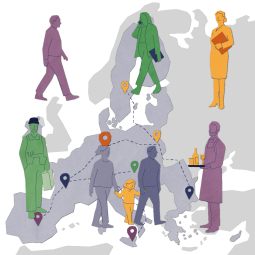
Posting of workers in focus with a week of key initiatives
Posting of workers in focus with a week of key initiatives
Ongoing initiatives under the POSTING 360 Programme bring together national authorities, social partners, and posting experts.
This week, the European Labour Authority is putting the posting of workers at the centre of its agenda, leading a series of coordinated actions under its POSTING 360 Programme. With more workers being posted across EU borders and increasing numbers of Portable Documents A1 issued, effective cross-border cooperation is crucial for the proper application of the posting rules, benefiting both employers and workers.
Forum on posting of workers: ELA is hosting the fifth meeting of the Forum on posting of workers on April 1–2, in collaboration with the European Commission. The Forum brings together national authorities, social partners, and posting experts to discuss and exchanges on key topics, including:
The Forum opens space for dialogue and exchange, reinforcing mutual learning and understanding across Member States.
New report: bi- and multilateral cooperation agreements on labour mobility. The ELA is also releasing a report analysing over 60 bilateral and multilateral agreements. It explores how administrative cooperation agreements between Member States work in practice:
The findings reveal ways to enhance cooperation in labour mobility, focusing on the posting of workers, and emphasise ELA's role in promoting stronger cooperation between Member States.
Training for inspectors and social partners. To boost enforcement skills and build mutual understanding, ELA is delivering two dedicated training sessions:
Since its establishment, ELA has made the posting of workers at the centre of its activities—developing tools and programmes to improve information exchange, share good practices, and build up understanding of national and EU rules.
ELA is moving forward with a three-part strategy: analysing how countries work together, discussing shared challenges with key stakeholders, and engaging national authorities and social partners through targeted trainings. All with one goal—making cross-border work fairer and smoother for everyone involved.